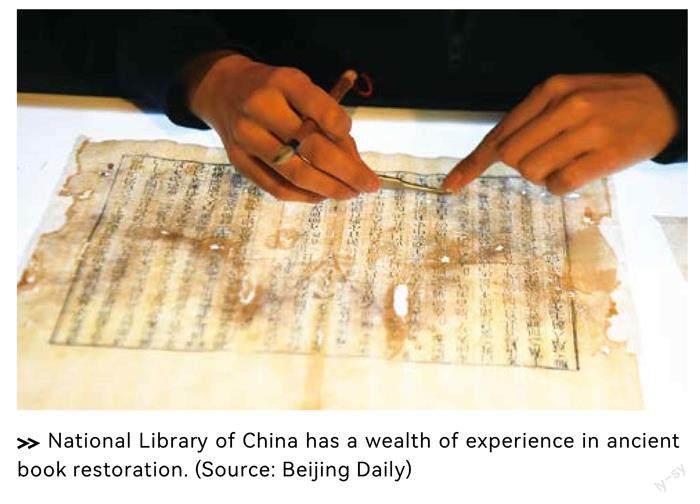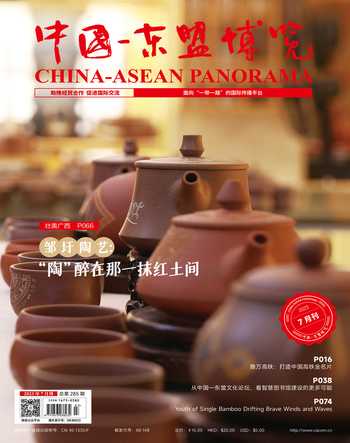Seeking More Possibilities of the Smart Libraries Construction from the China-ASEAN Cultural Forum
Written by Zhong Shuangxia / Translated by Tang Yi

Books play a crucial role in preserving and transmitting culture, and reading serves as a significant means of inheriting culture. Libraries serve not only as repositories of books but also as central hubs for national reading initiatives. Currently, the development of libraries has entered an era of digitalization and information sharing. There is no doubt that libraries will take on even more essential tasks in the future.
On June 19, the 18th China-ASEAN Cultural Forum with the theme of “Smart Library Construction and Reading Promotion” was held in Nanning, Guangxi. We learned about the new mission and vision of deep cooperation in library construction and book publishing proposed by the Chinese and ASEAN guests and relevant international organizations and felt the charm of culture enriched by mutual learning and exchange.
Focusing on smart library construction and reading promotion
Today, libraries are acquiring new cultural meanings due to the advancements in digital technology, facilitating online reading at our fingertips. “In the digital age, smart libraries will upgrade the management and service system of traditional libraries, making them more efficient and user-friendly, enabling more people to access books easily, thus spending more time in libraries,” said Shi Zhongjun, Secretary-General of the ASEAN-China Centre, who stressed the vital role of digital technology in the construction of smart libraries.
Revolving around the theme “Smart Library Construction and Reading Promotion,” the guests reviewed the rapid development of library construction, shared new attempts and initiatives in promoting national reading, and expressed their opinions on the significance and goals of smart libraries, exploring the exchange and cooperation between China and ASEAN in the field of smart library.
“We are willing to actively play the role of the Silk Road International Library Alliance, strengthen international exchanges and cooperation with countries along the ‘Belt and Road’ initiative, including ASEAN countries, in the smart library construction, Silk Road literature sorting and development, librarian training, ancient books promotion and so on,” said Rao Quan, Deputy Minister of the Ministry of Culture and Tourism of China. He expressed his hope to advance cooperation with ASEAN countries in various aspects of the library and promote the construction of smart libraries together.
The increased economic and trade exchanges between China and ASEAN countries have been accompanied by an upgrade in cultural exchanges and cooperation. As important hubs of regional cultural cooperation, China and ASEAN countries enhance cooperation and mutual assistance among libraries and promote the upgrading of cooperation between libraries and the publishing industry, which has become an essential issue.
Wissanu Krea-ngam, Deputy Prime Minister of Thailand, said that smart library construction is the main channel to enhance cultural digitalization, and China is currently in a stage of rapid development in this aspect. In recent years, Thailand has also been seeking to revitalize libraries and explore new possibilities for digital libraries. In the context of globalization, international cooperation and development in the library is an inevitable trend. “I hope that China and Thailand will have more cooperation in smart library construction in the future,” he said.
U Ko Ko, Union Minister of Religious Affairs and Culture of Myanmar, also proposed that libraries in China and ASEAN countries will share experiences and knowledge on protecting cultural heritage through cooperation, and help enrich the approaches to preserve our cultural treasure.
At present, many ASEAN countries like Laos still face challenges such as lack of technology and human resources to achieve the modernization of smart libraries. Suanesavanh VIGNAKET, Minister of Information, Culture and Tourism of Laos, noted that Laos desires to cooperate with ASEAN member states and dialogue partners, especially China, which is a comprehensive strategic partner of ASEAN and has advanced technology and expertise.
The confidence and resolution of China and ASEAN countries in working together inject tremendous momentum into the development of the library industry.
Discuss the restoration of ancient books and cooperation in book publishing
The long and rich history of human civilization can be understood by delving into the pages, scrolls, and volumes of ancient books. However, ancient book restoration faces obstacles such as limited technologies, lack of attention in industry, and a shortage of professionals. As a result, many old scrolls are left dormant in the restoration rooms of libraries. To ensure that these ancient books are no longer neglected, experts and scholars from China and ASEAN countries share their collaborative achievements in ancient book restoration and preservation and envisioned possibilities for future cooperation.
Chen Hongyan, Chief Librarian of the Ancient Books Department of the National Library of China, told how the National Library developed restoration and protection auxiliary equipment and used modern technology to restore the eye-catching Dunhuang documents and the Yongle Encyclopedia. The case fully manifests the important role of technology in the restoration and protection of ancient books. She said that “I expect the power of technology to make the restoration and protection of ancient books better developed.”
Yao Boyue, Professor of the Ancient Books Preservation Institute of Tianjin Normal University, introduced how the teachers and students of the Institute promoted the latest actions of international cooperation in ancient book protection from the international perspective. He also emphasized that the Institute is willing to cooperate with ASEAN countries and provide as much help as possible for the cataloging of ancient books.
“If any opportunities, I would like to cooperate with China and ASEAN countries to explore new trends and new practices in library digitalization construction, ancient library collection restoration and protection,” said Kay Thi Aye, Director of National Library of Myanmar. He also proposed that the two parties need to achieve common commitments, share their resources, and carry out technical training and personnel exchange programs.
In addition, this forum has opened its doors for collaborative exchanges in publishing. China and ASEAN countries have had a strong foundation and friendship in book publishing. At the forum, experts and scholars from the publishing sector of China and ASEAN also shared their experiences in book publishing and outlined a bright future for cooperation, looking forward to further cultural exchange and cooperation between the two sides.
Practical achievements boost the China-ASEAN libraries cooperation
In fact, smart library construction, national reading, ancient books restoration and protection are topics that have received high attention in China in recent years. In June 2021, the Ministry of Culture and Tourism of China issued Cultural Development Plan for the 14th Five-Year Plan Period, making top-level design and systematic arrangements for culture. The Plan requires the transformation of library functions to be “people-centered” and calls for building open, smart, inclusive, and shared modern libraries, making public libraries an important place to enrich people’s minds and cultivate cultural confidence. Meanwhile, it requires libraries-related departments to carry out national reading campaigns and strengthen the sorting, protection, inheritance, and utilization of ancient books.
In terms of promoting the high-quality development of the library industry, this forum also achieved pragmatic results. At the event, some libraries from China and ASEAN countries officially issued the China-ASEAN Library Alliance Initiative, which established the China-ASEAN Library Alliance, focusing on cooperation in areas such as library personnel exchange and training, technology resource sharing, and integrated innovation and development. The initiative calls on all parties to strengthen the construction of regional cooperation platforms, carry out multi-field dialogues through multiple channels, and jointly discuss the strategies for library transformation and reform, in a bid to foster inclusive development of human civilization and open cooperation of libraries and achieve common development.
In addition to the forum, there are also many exciting activities taking place. On June 19, the exhibition themed “Pearl Returns to Hepu, Emerging Brand New After Disaster” Revival and Repairment of the Yongle Encyclopedia was opened at the Library of Guangxi Zhuang Autonomous Region which will last for one year and is open to the public for free. As the largest encyclopedia in the world, the Yongle Encyclopedia is regarded as the treasure of the National Library of China, and its exhibition will bring the audience a cultural feast spanning hundreds of years.
The door to library transformation has been opened by the digital age, allowing us to access documents, data, information, and knowledge in a more efficient and convenient way. It is undoubted that this forum has taken the cooperation between China and ASEAN countries in smart library construction and reading promotion to new heights, enabling both sides to better understand each other and paving the way for future cooperation.
National Library of China has a wealth of experience in ancient book restoration. (Source: Beijing Daily)

